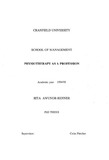JavaScript is disabled for your browser. Some features of this site may not work without it.
| dc.contributor.advisor | Fletcher, Colin | |
| dc.contributor.author | Awunor-Renner, Rita | |
| dc.date.accessioned | 2020-04-07T11:08:49Z | |
| dc.date.available | 2020-04-07T11:08:49Z | |
| dc.date.issued | 1995 | |
| dc.identifier.uri | http://dspace.lib.cranfield.ac.uk/handle/1826/15378 | |
| dc.description.abstract | This case study of the physiotherapy profession is practitioner research, undertaken in the unique research role in which the researcher was also the manager of the organisation being researched and a member of the profession being researched. The dual aim of the study was to contribute to the theory of professions, as well as the practice of managing a profession in the context of an organization (the NHS). The theoretical aim was fulfilled by establishing the "specific pattern of profession" of physiotherapy; its practical contribution was the identification of factors of a management model which were critical to implementing professionalism in the organizational context of the NHS. The factors were: "diffuse organization" in "highly organic, fluid and self-generating" specialist team structures, located at the middle stratum of the organization, which gives the incumbents of "technical" (clinical) knowledge a role on shaping the context to clinical work (in operational and strategic planning). This new professional role of "research-orientated managing clinician" includes the evaluation of work based on research and other investigative procedures. This was at a time when the state bureaucracy's interests coincided with the profession's interests in establishing professional autonomy in physiotherapy and a professional type of knowledge and skill system. Guided by the concept of profession proposed by Kocka and Torstendahl (1990), this case study identified the details of professional knowledge and skill systems and constructed a physiotherapy-specific typology of knowledge and skills (based on the literature about professional knowledge systems and interviews). The typology was used to test the knowledge and skill base in physiotherapy practice by in-depth interviews. Research methods were both conceptual as well as empirical. The empirical part was predominantly based on a qualitative approach through in-depth interviews. The data was supplemented by documentary evidence and my observations as a participant observer. The study contributes to our knowledge and understanding of the physiotherapy profession and the new concept of profession by establishing the specific pattern of profession for physiotherapy. The role of "organization" (a "professional resource" in the actor-based framework) was found to be critical for the implementation of professionalism in practice. "Organization" was specified on the basis of this case study as "organic, fluid and selfgenerating". New knowledge and skill categories were identified in this study. These categories were: breadth of knowledge, the ability to generalise from the technical to nontechnical domains ("knowledge and skill transfers"), "organic" type of communication and confidence. The study also contributes to our understanding of the research methods of practitioner research from this unique triple role. | en_UK |
| dc.language.iso | en | en_UK |
| dc.rights | © Cranfield University, 2015. All rights reserved. No part of this publication may be reproduced without the written permission of the copyright holder. | |
| dc.title | Physiotherapy as a profession. | en_UK |
| dc.type | Thesis | en_UK |
